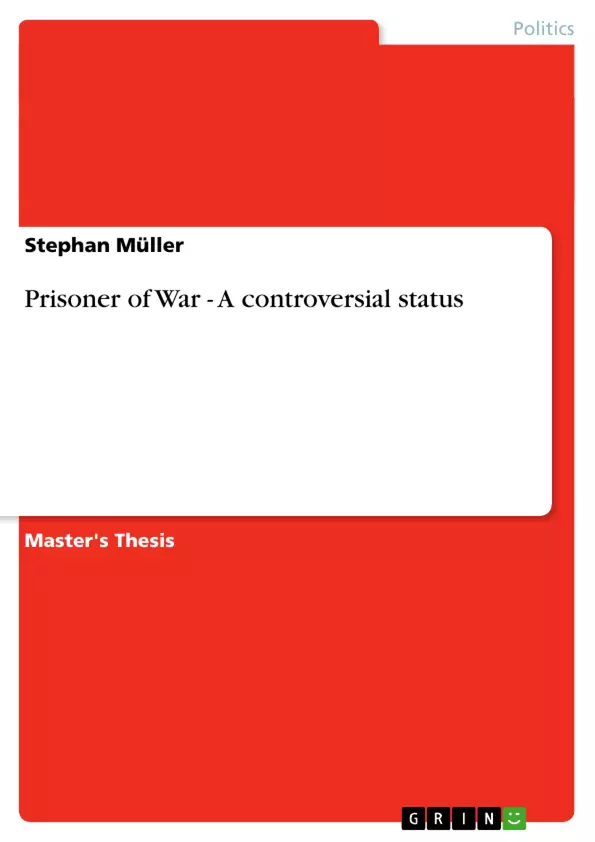The status, Prisoner of War reveals many issues. This paper examines the meaning of the term Prisoner of War (POW) and discusses the topic with a focus on the US State practice.
In particular the treatment of the prisoners, who have been captured in the context of the Afghanistan War and the fight against terrorism, is taken into account. Under this section also the quandary of an adequate and justifiable classification of the different categories of prisoners is discussed. In this context also the terms "unlawful combatant” and "war on terror” are addressed. In addition the relation between Humanitarian Law, Human Rights and Domestic Law is considered and brought into relation with decisions of the US Courts. Additionally the issue of criminal liability under Domestic and International law is raised.
The paper concludes with a summary of the findings and an appraisal of the results followed by a perspective to future developments.
Inhaltsverzeichnis (Table of Contents)
- A) Summary
- B) Introduction
- I. Humanitarian Right
- II. Armed Conflict
- III. Protected groups
- 1. The Taliban soldiers
- 2. The members of Al-Qaeda captured within the Afghanistan Conflict
- 3. The Al-Qaeda members captured within the "War on Terror" beyond the Afghanistan Conflict
- IV. Status determination in doubtful circumstances
- 1. Cases of doubt
- 2. Competent tribunal
- V. The State Practise of the USA
- VI. Due process rights
- 1. Right to employ a lawyer
- 2. The writ of habeas corpus
- VII. Criminal responsibility
- C) Conclusion
Zielsetzung und Themenschwerpunkte (Objectives and Key Themes)
This research paper examines the legal status of prisoners of war (POWs), specifically focusing on US state practice regarding detainees captured during the Afghanistan War and the "War on Terror." The paper analyzes the justifiable classification of prisoners, including the controversial designation of "unlawful combatants," and explores the relationship between humanitarian law, human rights, and domestic law within the context of US court decisions. The implications of criminal liability under both domestic and international law are also considered.
- The definition and application of Prisoner of War (POW) status under the Geneva Conventions.
- The legal implications of classifying detainees as "unlawful combatants."
- The interplay between humanitarian law, human rights law, and US domestic law in the treatment of detainees.
- Due process rights afforded to detainees, including access to legal counsel and habeas corpus.
- The criminal responsibility of detainees under international and domestic legal frameworks.
Zusammenfassung der Kapitel (Chapter Summaries)
A) Summary: Provides a brief overview of the paper's key findings and arguments.
B) Introduction: Sets the context by discussing the Authorization for Use of Military Force against Terrorists and the detention of prisoners at Guantanamo Bay. It highlights the controversies surrounding the legal status of these prisoners and the denial of POW status.
I. Humanitarian Right: Traces the historical evolution of POW rights, culminating in the Geneva Conventions and their emphasis on humane treatment.
II. Armed Conflict: Discusses the criteria for determining the existence of an international armed conflict and concludes that such a conflict exists based on US military actions in Afghanistan.
III. Protected groups: Analyzes the criteria for POW status under the Geneva Conventions and examines whether Taliban soldiers and Al-Qaeda members meet these criteria. The complexities of applying these criteria to the diverse groups involved in the conflict are explored.
IV. Status determination in doubtful circumstances: Explores the procedures for determining POW status in ambiguous cases and examines the role of competent tribunals.
V. The State Practise of the USA: Critically assesses US state practice regarding the treatment of detainees, focusing on the Combatant Status Review Tribunal (CSRT) and its processes. It discusses the legal challenges to US detention practices and relevant Supreme Court rulings.
VI. Due process rights: Examines the denial of legal counsel and access to habeas corpus, contrasting this with internationally recognized due process rights. Relevant case law is discussed.
VII. Criminal responsibility: Investigates the jurisdictional aspects of prosecuting detainees for war crimes or terrorist acts. This section examines the legal basis and implications of using military commissions and compares that to internationally accepted standards of criminal justice.
Schlüsselwörter (Keywords)
Prisoner of War, Geneva Conventions, unlawful combatants, War on Terror, Guantanamo Bay, humanitarian law, human rights, due process, habeas corpus, military tribunals, criminal responsibility, Combatant Status Review Tribunal (CSRT), Hamdan v. Rumsfeld, Boumediene v. Bush, Rasul v. Bush.
Frequently Asked Questions
What is the legal status of "unlawful combatants"?
This controversial term refers to detainees who are denied formal Prisoner of War (POW) status under the Geneva Conventions, often leading to legal disputes over their rights.
How does the Geneva Convention protect Prisoners of War?
The Geneva Conventions mandate humane treatment, protection against violence or intimidation, and specific rights for combatants captured during international armed conflicts.
What was the US practice regarding detainees at Guantanamo Bay?
The US often classified detainees from the Afghanistan conflict as "unlawful combatants," a practice challenged in several Supreme Court cases regarding due process and habeas corpus.
What is the role of a "competent tribunal" in status determination?
According to international law, if the status of a prisoner is in doubt, a competent tribunal must determine whether they qualify for POW protection.
Can Al-Qaeda members be classified as Prisoners of War?
This is a major point of legal debate; the paper explores whether non-state actors meet the criteria for protection under humanitarian law during the "War on Terror."
- Quote paper
- Stephan Müller (Author), 2009, Prisoner of War - A controversial status, Munich, GRIN Verlag, https://www.grin.com/document/123573



